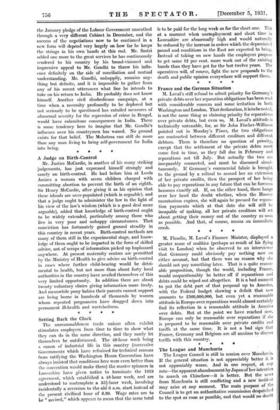France and the German Situation
M. Laval's stiff refusal to admit priority for Germany's private debts over her reparation obligations has been read with considerable concern and some irritation in both Washington and London. That declaration, it is to be noted, is not the same thing as claiming priority for reparations over private debts, but even so, M. Laval's attitude is technically untenable, for, as Sir John Fischer-Williams pointed out in Monday's Tinier, the two obligations arc contracted between different creditors and different debtors. There is therefore no question of priority, except that the settlement of the private debts must come first in time, as they fall due in February and reparations- not till July. But actually the two are inseparably connected, and must be discussed- simul- taneously. If Germany's commercial fabric is brought to the ground by a refusal to accord her an extension of her private credits, then the prospect of her .being able to pay reparations in any futnie that can be foreseen becomes exactly nil. If, on the other hand, there hangs over .her head the doubt whether, when the Hoover moratorium expires, she will again be pressed for repara- tion payments which at that date she Will still be incapable of making, all her private creditors will set about getting their money out of the country as soon as possible. And that, of course, means an imiriediate crash.
* * * *










































 Previous page
Previous page